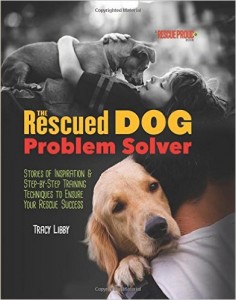This review is by Ranny Green and originally ran on the Seattle KC website October 14, 2015.
 The Rescued Dog Problem Solver, by Tracy Libby. I-5 Publishing. $19.95.Rescue dogs come packaged with a checkered past and plenty of uncertainty. Consequently, fashioning a well-balanced guidebook for preparation and managing that waif has been almost non-existent until now.It’s not like you can turn to match.com or one of its equivalents and maneuver through a checklist of compatibility. Most rescue dogs come with no bio, and for those that do, it’s adopter beware, since these are often riddled with untruths from the releasing owner.
The Rescued Dog Problem Solver, by Tracy Libby. I-5 Publishing. $19.95.Rescue dogs come packaged with a checkered past and plenty of uncertainty. Consequently, fashioning a well-balanced guidebook for preparation and managing that waif has been almost non-existent until now.It’s not like you can turn to match.com or one of its equivalents and maneuver through a checklist of compatibility. Most rescue dogs come with no bio, and for those that do, it’s adopter beware, since these are often riddled with untruths from the releasing owner.
Libby cuts to the chase with a no-nonsense approach, leading off each chapter with a vignette of a dozen riveting cases in point of the subject (shelter dog) at hand. In fact the opener, “J’Mee and Jake: A Tale of Two Terriers,” focuses on her eightysomething parents with an apparent adventurous spirit adopting the high-energy pair and “lucking out.”
Kinda reminds me of our little pistol, Maggie May, a 4-year-old Pembroke Welsh Corgi we adopted when she was a year old through a Seattle rescue organization. She had been purchased as puppy by an area eightysomething couple both being treated for cancer with chemotherapy.
She segued into our household smoothly and has become a neighborhood and dog-park favorite. But she needs daily exercise and socialization just like any other young dog.
Libby emphasizes the importance of your demeanor and emotions and its impact on your dog’s behavior. Again, the uncertainty of a rescue’s dog’s background makes a balance-beam training approach critical. In that respect, Libby offers up a nice mix of training techniques designed to make the adoption process smooth and to establish a bonding process from the start.
Chapters address safe introductions, socialization, body language, bonding, barking, housetraining, submissive urination, separation anxiety, aggression, running away, high drive and special needs.
Because many adoptions are consummated in shelters, Libby writes, “Extended periods in a shelter environment can quickly chip away at a dog’s spirit. Bad behavior isn’t always what it seems and dogs living in a shelter environment are often scared, confused, lonely and act out as a result. For this reason, a dog’s true personality and temperament are often difficult to assess.”
There are accounts here of love at first sight but with warnings, too, that what you see within the psychological landscape of a shelter isn’t always what you get beyond its entry door. Make no mistake about it, the author notes that a rescue dog is a project and should be a lifetime commitment. It’s been rejected or discarded once, maybe more, and it can play with the animal’s psyche before it becomes your soulmate. .
Libby says, “Keep in mind that your new dog stopped being a rescue the second he came to live with you. The day you adopted him – that’s the first day of his new life. Avoid feeding into his phobias by continuing to call him a rescue dog or by focusing on his shortcomings. Focus on the positive and build on his strengths as you go about laying the foundation for a strong human-canine bond.”
Libby nimbly crafts a rationale for adopting a rescue dog, yet noting a wide mix of caveats, too. “The Rescued Dog Problem Solver” is packed with nuggets of wisdom and a refreshing delivery packaged in a colorful presentation of photos and breakout boxes of tips.

